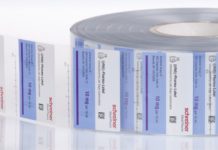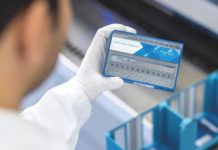DNA Electronics Ltd. a developer of semiconductor solutions for real-time DNA and RNA detection, today announces that DNA Electronics Chairman and CEO Professor Chris Toumazou FRS will be an invited speaker at the upcoming “The Future of Genomic Medicine V” conference presented by the Scripps Translational Science Institute (March 1-2 2012, La Jolla, California).
Professor Toumazou will be speaking as part of the “Hot Topics in Genomic Medicine” track, addressing a key presentation on “DNA Transistors and Handheld Sequencing” to the conference audience of physicians, healthcare professionals, human geneticists, genomic scientists and researchers. Prof. Toumazou’s presentation will explore how scalable semiconductor solutions for real-time nucleic acid detection can enable faster, simpler and more cost-effective DNA analysis platforms.
DNA Electronics – a spin-out of Imperial College London – was founded by semiconductor healthcare pioneer Prof. Toumazou, the inventor of the company’s core technology that allows ion-sensitive CMOS transistors to be switched on and off with DNA. Prof. Toumazou’s innovation has culminated in the world’s first DNA logic on standard CMOS technology. DNA Electronics has worldwide non-exclusive licensing agreements with Roche’s 454 Life Sciences and Ion Torrent (Life Technologies Inc.), providing access to DNA Electronics’ proprietary semiconductor technology portfolio, which enables sensitive detection of nucleotide incorporation during sequencing.
The fifth Future of Genomic Medicine conference will focus on the extraordinary advances that are occurring in the field, which include whole genome and exome sequencing, pharmacogenomics, and advances in cancer treatment as an outgrowth of genomics. The 2012 conference features a two-day curriculum from a renowned faculty representing the country’s leading institutions, headed by Director of Scripps Translational Science Institute Eric Topol M.D.
Part of San Diego, California-based Scripps Health, the Scripps Translational Science Institute (STSI) is a unique community collaboration that initiates research that moves basic science from the lab to the patient bedside. STSI is supported by the NIH flagship program, Clinical and Translational Science Award (CTSA).
Collaborators in the STSI consortium include Scripps Health; The Scripps Research Institute; the Burnham Institute for Medical Research; Children’s Hospital of Philadelphia; Genomics Institute of the Novartis Research Foundation; The J. Craig Venter Institute; Salk Institute for Biological Studies; San Diego State University; San Diego Supercomputer Center; and The Neurosciences Institute.
For full details of “The Future of Genomic Medicine V” conference, please visit the website: http://www.scripps.org/events/
About DNA Electronics
DNA Electronics is a developer of semiconductor solutions for real-time nucleic acid detection which enables faster, simpler and more cost-effective DNA analysis platforms. The company’s IP portfolio includes techniques for monitoring nucleotide insertions using ion-sensitive transistors, enabling label-free electronic DNA sequencing and diagnostics platforms using standard CMOS microchip technology. DNA Electronics (DNAe) has developed the Genalysis® platform of disposable silicon chip-based solutions for real-time nucleic acid sequence detection at the point of care, providing end users with technology as yet unavailable outside a laboratory.
DNAe’s Genalysis® portfolio of silicon-based point-of-care solutions delivers fast and accurate handheld gene tests with all the appeal of consumer electronics: anytime, anywhere. Interchangeable, disposable “lab-on-chip” cartridges can be tailored to any sequence of interest, making this a customizable semiconductor technology amenable to a wide variety of applications and markets. The ability to accurately detect a gene sequence in real-time using a standalone, fully portable, low power electronic readout presents disruptive new opportunities in diagnostics, data capture and therapy.For more information: http://www.dnae.co.uk


























